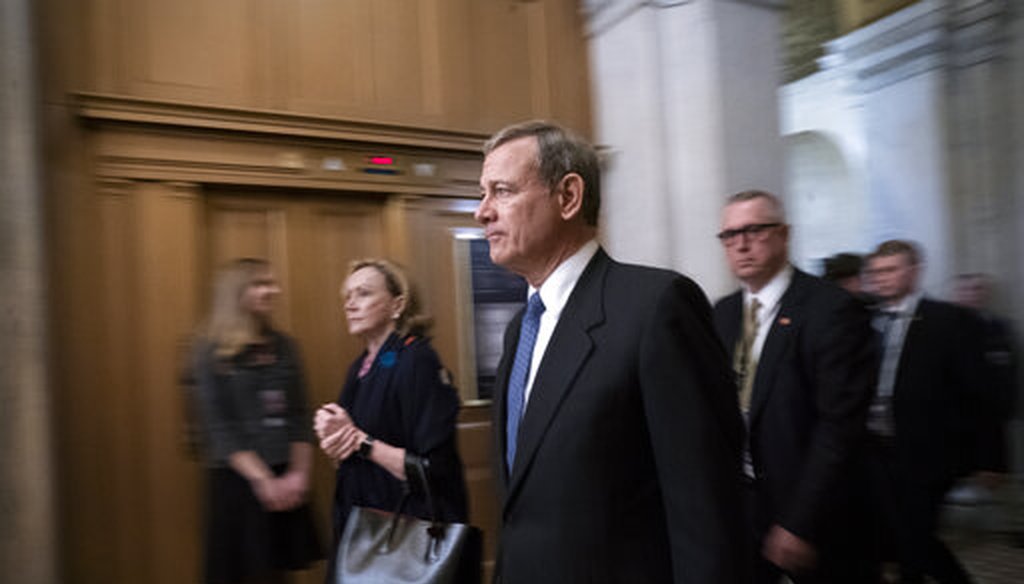Stand up for the facts!
Our only agenda is to publish the truth so you can be an informed participant in democracy.
We need your help.
I would like to contribute

Chief Justice John Roberts leaves the Senate following arguments in the impeachment trial of President Donald Trump in Washington on Jan. 25, 2020. (AP/Applewhite)
Senators took control of their chamber’s impeachment trial this week, submitting questions to the Democratic House managers and President Donald Trump’s legal team.
The questions, provided to Chief Justice John Roberts in writing, gave a window into the senators’ thinking as they consider whether to remove a president from office for the first time.
But House managers and the Trump team spun their answers to serve their perspective. So we decided to take on the questions ourselves, with the facts in mind.
The question (from Democratic senators): "Does the phrase ‘‘or other high Crimes and Misdemeanors’ in Article II, Section 4 of the Constitution require a violation of the U.S. criminal code or is a breach of public trust sufficient?"
Our answer: A criminal violation is not necessary. Federalist Paper 65, written by Alexander Hamilton, refers to impeachment as stemming from "offenses which proceed from the misconduct of public men, or, in other words, from the abuse or violation of some public trust."
"There is little doubt that this argument has been accepted in the past as a statement of the framers’ intent," said Stephen M. Griffin, a Tulane University law professor.
The actual phrase in the Constitution’s impeachment language, "high crimes and misdemeanors," means "an affront to the state, to the people, the body politic," said Jeffrey A. Engel, director of the Southern Methodist University Center for Presidential History and a contributor to the 2018 book "Impeachment: An American History."
"A president, or any leader really, need not break any statute in order to break the public’s trust."
The answer (from a House impeachment manager): "You could have activities that are so dangerous to our Constitution, that are not a crime, that would be charged as an impeachable offense because they are an abuse of power. That is what the framers worried about."
The question (from Republican senators): "As a matter of law, does it matter if there was a quid pro quo? Is it true that quid pro quos are often used in foreign policy?"
Our answer: Quid pro quos are not unusual in foreign policy. They are a common way for countries to try to leverage desired actions by other countries. What’s at issue here is whether the exchange benefits the country’s broad policy goals, or whether it benefits the president’s personal interests.
Hamilton’s language in Federalist 65 means that violations of public trust are defined as things that hurt the body politic. Griffin said, "it can’t be true that the president gets to define that, especially when an election is on line."
It’s not surprising that the incumbent will feel that way, he said, but "so does the competitor."
The answer (from Trump’s defense team): "If a president does something which he believes will help him get elected — in the public interest — that cannot be the kind of quid pro quo that results in impeachment."
The question (from Democratic senators): "Isn’t it true that the chief justice, as presiding officer in this trial, has the authority to resolve any claims of privilege or other witness issues, without any delay?"
Our answer: The reach of Roberts’ authority remains an open question, with only two chief justices having ever assumed the role Roberts now fills.
The current Senate rules for impeachment say the chief justice "shall direct all forms of proceedings" in the Senate trial. But Roberts is not all-powerful. A simple majority of senators can vote to overrule him, and Republicans hold 53 seats in their Senate majority.
On evidence, the rules say the chief justice "may rule on all questions of evidence including, but not limited to, questions of relevancy, materiality, and redundancy," and that a single senator can ask the Senate to vote on any ruling Roberts makes, leaving the outcome up to the majority.
Some in support of a more active role for Roberts on the question of calling witnesses have pointed to a separate line in the rules giving the chief justice the "power to make and issue, by himself or by the Secretary of the Senate, all orders, mandates, writs, and precepts."
But there’s not much precedent guiding Roberts’ role, experts told us. The chief justices in the trials of Johnson and Clinton tended to yield to senators. Chief Justice Salmon Chase did break two tied votes during Johnson’s trial, under different rules.
The answer (from a House impeachment manager): "The answer is yes."
The answer (from Trump’s defense team): "The idea that the presiding officer of this proceeding could determine a waiver or an applicability of executive privilege would be quite a step," without historical precedent.
The question (from Republican senators): "Is the standard for impeachment in the House a lower threshold to meet than the standard for conviction in the Senate, and have the House managers met their evidentiary burden to support a vote of removal?"
Our answer: The Senate trial is not a criminal trial, so, it doesn’t require the same, high standard for conviction as a criminal trial.
The Constitution in Article I, Section 3 decoupled impeachment from ordinary criminal law.
"Impeachment can remove a federal office holder and perhaps ban him or her from holding federal office in the future, but that is all," said Frank O. Bowman III, a University of Missouri law professor and author of the book High Crimes and Misdemeanors: A History of Impeachment for the Age of Trump. "Any punishment of the criminal kind can only be imposed by a court in an entirely separate proceeding."
The answer (from Trump’s defense team): The standards of criminal law apply in the Senate, "which means proof beyond a reasonable doubt."
On the timing of Trump’s pursuit of the Bidens
The question (from Republican senators): "Before Vice President Biden formally entered the 2020 presidential race in April 2019, did President Trump ever mention Joe or Hunter Biden in connection with corruption in Ukraine to former Ukrainian President Poroshenko or other Ukrainian officials, President Trump's cabinet members or top aides, or others?"
Our answer: There’s no proof that Trump expressed concerns about the Bidens before Joe Biden announced he was running for president April 25, 2019.
The minority report of the House Intelligence Committee, written by Republicans, noted testimony from senior State Department official George Kent that he raised concerns about Hunter Biden’s position with Burisma Holdings to Biden’s office in 2015. It said nothing about concerns Trump expressed in advance of Biden’s candidacy.
Trump never tweeted about the Bidens and Ukraine between the day he was elected and the day Biden jumped in the 2020 race, either. Searching Factba.se’s database, we also found no Ukraine-related references to the Bidens in Trump’s public speeches and interviews during that same timeframe.
The answer (from Trump’s defense team): "It wasn't thoroughly pursued in the record, so I can't point to something in the record that shows President Trump, at an earlier time, mentioning specifically something related to Joe or Hunter Biden."
Our Sources
Congressional Record, Jan. 29, 2020
C-SPAN, coverage of Senate impeachment trial
Senate impeachment rules, 1986 version
U.S. Senate, "The Impeachment of Andrew Johnson," accessed Jan. 30, 2020
House of Representatives, "List of Individuals Impeached by the House of Representatives," accessed Jan. 30, 2020
Congress.gov, "A resolution to provide for related procedures concerning the articles of impeachment against Donald John Trump, President of the United States," Jan. 22, 2020
Congressional Research Service, "The Impeachment Process in the Senate," Jan. 21, 2020
The New York Times, "John Roberts Can Call Witnesses to Trump’s Trial. Will He?" Jan. 27, 2020
Frank O. Bowman III, "Constitutional Crabgrass: President Trump’s Defenders Distort the Impeachment Clause," Jan. 24, 2020
The Washington Post, "New phase of impeachment trial could change Roberts’s role: more judging, less substitute teacher," Jan. 29, 2020
Politico, "Why Is John Roberts Even in the Impeachment Trial?" Jan. 22, 2020
Washington Post, "The 5 most interesting Q&As from the Senate impeachment trial, so far," Jan. 30, 2020
USA Today, "Trump lawyer Dershowitz argues president can't be impeached for an act he thinks will help his reelection," Jan. 30, 2020
PolitiFact, "What counts as a high crime or misdemeanor for impeachment? Justin Amash got it right," May 29, 2019
PolitiFact, "The Senate impeachment trial is here. So what’s next?" Jan. 15, 2020
PolitiFact, "Read House Republicans' response to impeachment report," Dec. 3, 2019
PolitiFact, "Read the House Intelligence Committee's full impeachment report," Dec. 3, 2019
PolitiFact, "Timeline — The Trump impeachment inquiry," Oct. 3, 2019
PolitiFact, "Rudy Giuliani's role in Ukraine's investigation of Joe Biden," Sept. 26, 2019
PolitiFact, "How the impeachment articles against Trump are similar to, and different from, Clinton and Nixon," Dec. 10, 2019
Searches on Twitter and Factba.se.
Email interview with James Robenalt, attorney who teaches a course on Watergate, Jan. 30, 2020
Interview with Frank O. Bowman III, University of Missouri law professor and author of the book High Crimes and Misdemeanors: A History of Impeachment for the Age of Trump, Jan. 30, 2020
Interview with Stephen M. Griffin, Tulane University law professor, Jan. 30, 2020













































